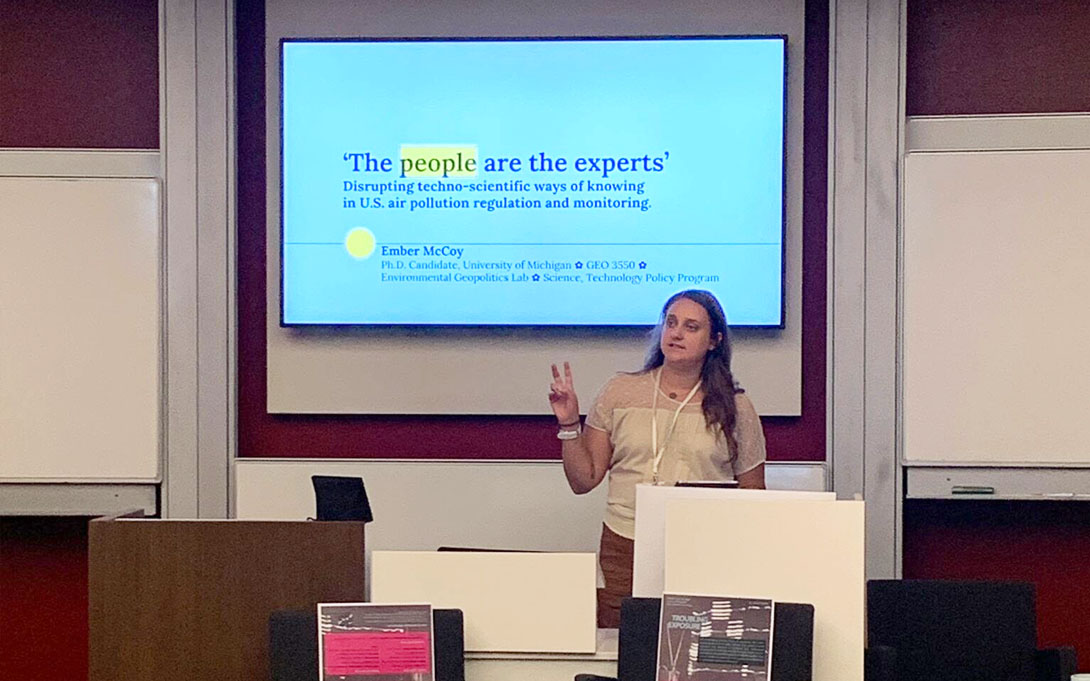
By Ember McCoy, PhD Candidate, Environmental Policy & Justice
In July, I attended the joint meeting of the European Association for the Study of Science and Technology (EASST) and the Society for Social Studies of Science (4S) in Amsterdam, thanks in part to the STPP Student Career Development Grant. The conference brings together scholars of Science and Technology Studies (STS), and this year’s theme was “making and doing contributions to transformations in an era of grand societal challenges” inviting us to curate conversations on how these “grand societal challenges” such as our “reliance on fossil fuels, fostering solidarities across migration statuses and diverse identities, and turning our workplaces into decolonial practices” relate to our research; how they shape our positionality and reflexivity; and how they impact both our academic and personal lives.
Throughout the four-day conference, I attended countless panels that both reaffirmed and expanded my sub-interests with the STS field, spanning topics such as the politics of quantification and quantifying the “body”; the ubiquity of pollution—highlighting the experiences of those living with pollution (my favorite panel!); epistemic knowledge and competing knowledge frames; STS approaches to studying contestations of evidence-based knowledge; and reproductive justice in Palestine. I really enjoyed hearing and learning from other scholars, particularly from a wide-range of international perspectives, which was relatively unique as this was my first conference outside of the United States. What I enjoy most about these opportunities is meeting others who share similar interests, and at EASST/4S, I made many new connections, learned more about the research of my UM friends and colleagues, and re-connected with friends and faculty from the Harvard STS Summer School I attended in 2021 (some of whom—like those at European and Asian Universities—I hadn’t seen since then).
On Friday, July 19th, I presented a draft chapter of my dissertation in a 3-session panel series titled “Troubling exposure: (counter)-knowledge practices and the democratization of environmental epistemologies.” I discussed my work in Southwest Detroit, detailing how environmental justice (EJ) activists disrupt technoscientific ways of knowing air pollution safety. Using a case study of two specific activists methods, I argued that activists use strategies that intentionally shift the authority, scope, and data to assert their own ways of knowing EJ problems. Other panelists discussed exposure to bat guano in Texas prisons, state regulation of hog farms in North Carolina, public expertise after Fukushima, PFAS pollution of swimming areas in Europe, and sound pollution in North Carolina and Sweden, among others. It was incredible to present, listen, and ideate with other scholars working in this “troubling exposure” space, and I appreciated the opportunity to get feedback and make new connections.
However, I’d be remiss not to mention that this final day—including the final roundtable of my 3-session panel series—was disrupted by protestors from VU for Falestine, the coalition of students and staff for Palestine at Vrije Universiteit Amsterdam, the host University of the conference. When I approached the University building hosting the conference that morning, I noticed University staff cleaning red paint from the windows outside and was surprised to see security’s requiring us to show badges to move in and out of the conference doors, when we hadn’t any day prior. These moments were clarified during lunch, when VU for Falestine protestors walked through the outdoor gathering space chanting and handing out flyers that called out EASST/4S for purporting to value “decoloniality” while taking place at a University with ties to Israel and remaining silent on the genocide in Palestine. While many conference attendees gathered to listen to the protesters remarks, the University responded by swiftly locking all conference doors, trapping attendees either inside or out depending on where they were at the time. The University, in collaboration with local law enforcement, policed and restricted our movements throughout the remainder of the afternoon, despite the protestors’ original stated desire to not fully block the conference doors, only wanting to raise awareness about the issue and the hypocrisy at hand.
This response to the protestors shocked me, and I was disappointed to see so many conference attendees move on throughout the day, with no acknowledgement of the protests ever coming out from the EASST/4S organizers. However, throughout the afternoon I made many new incredible connections with other scholars and local activists, and together we discussed our desires to push EASST/4S and our institutions to truly embody their stated goal of recognizing the “grand societal challenges” that are “increasingly becoming part of our scholarly and personal lives,” in this case, calling attention to Israel committing genocide in Gaza. Reflecting now, I think this final day perfectly summed up my feelings throughout the conference and this last year: if, we, as scholars who elucidate the false neutrality of science and technology governance; who study the politics of care and trust; and who disrupt unquestioned societal acceptance of surveillance, AI, technoscientific design, militarism, and state violence, cannot recognize and call out such horrors in real time, who can? And who are we to say we are “experts” in these topics and social justice while leaving the people currently experiencing these harms behind?
